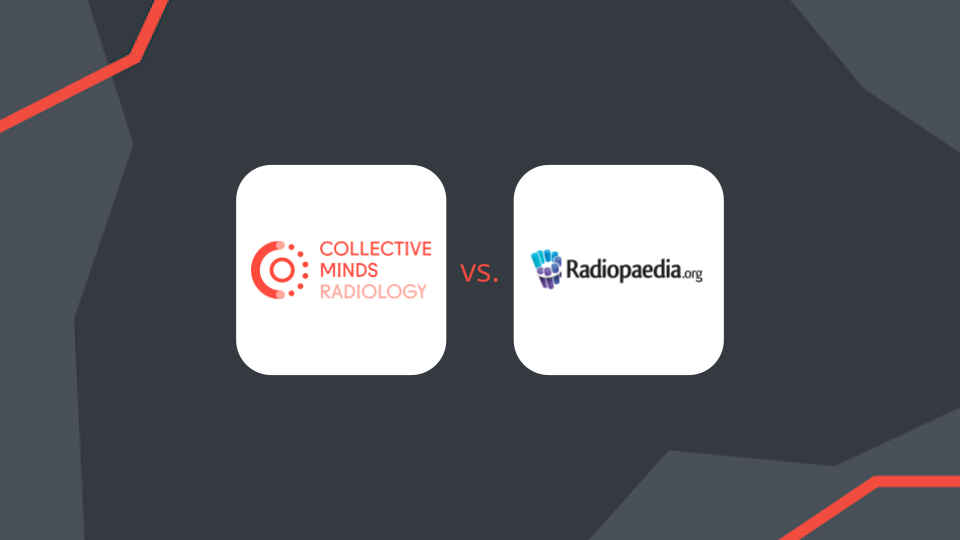Radiopaedia vs Collective Minds Education: Which Radiology Education Platform? (2025 Comparison)

When it comes to radiology education platforms, both Radiopaedia and Collective Minds have established themselves as leading resources in the field. If you're wondering which platform might better suit your needs, this detailed comparison will help you make an informed decision.
While Radiopaedia excels as a comprehensive, wiki-style reference platform with extensive case libraries and peer-reviewed content, Collective Minds stands out for its interactive teaching tools, structured educational programs, and advanced collaboration features. Both platforms serve different yet complementary purposes in radiology education.
Radiopaedia: The Wikipedia of Radiology
According to Wikipedia, Radiopaedia has emerged as "the largest freely available radiology-related resource" in the world, hosting an impressive collection of over 56,720 cases and 16,719 articles as of December 2023.
Key Strengths of Radiopaedia
-
Comprehensive Reference Library
- Peer-reviewed articles covering virtually all radiology topics
- Extensive case library with detailed annotations
- Regular updates from the global radiology community
-
Open Access Model
- Free access to core content
- Focus on accessibility for low and middle-income regions
- Community-driven content development
-
Quality Control
- Rigorous peer-review process
- Independent editorial oversight
- Standardized content format
Also Read: Free Online Radiology Courses: Advance Your Medical Imaging Skills from Home
Collective Minds Education: Interactive Learning Environment
Collective Minds Education takes a different approach by focusing on structured learning and interactive teaching tools. The platform emphasizes practical application and collaborative learning experiences.
Key Strengths of Collective Minds Education
-
Advanced Teaching Tools
- Interactive case presentations
- Annotation capabilities with vanishing lines and arrows
- Multimedia integration (images, PDFs, videos)
-
Structured Learning Experience
- Organized case collections by diagnosis or anatomy
- Build collaborative learning pathways
- Skill verification through quizzes and examinations
-
Collaborative Features
- Real-time discussion capabilities
- Case sharing and feedback
- Global networking opportunities
Also Read: How to Learn Radiology: A Comprehensive Guide for Learners
Platform Comparison
Content Organization
- Radiopaedia: Wiki-style organization with interconnected articles and cases
- Collective Minds Education: Structured learning paths with organized case collections
User Experience
- Radiopaedia: Excellent for quick reference and self-directed learning
- Collective Minds Education: Optimized for guided learning and interactive teaching
Target Users
- Radiopaedia: Ideal for individual learners and reference seekers
- Collective Minds Education: Perfect for educators and structured learning programs
Also Read: Why online case-based learning is the future of radiology education
Making Your Choice
Consider these factors when choosing between the platforms:
-
Learning Style
- Choose Radiopaedia for self-directed, reference-based learning
- Opt for Collective Minds Education for structured, interactive learning
-
Usage Purpose
- Reference and quick lookups: Radiopaedia
- Teaching and collaborative learning: Collective Minds Education
-
Experience Level
- Beginners and educators might benefit from Collective Minds Education's structured approach
- Advanced users may prefer Radiopaedia's comprehensive reference material
Summary
Both platforms excel in their respective areas:
- Radiopaedia serves as an invaluable, freely accessible reference resource
- Collective Minds Education provides a robust, interactive teaching and learning environment
The ideal choice depends on your specific needs, learning style, and intended use. Many professionals benefit from using both platforms complementarily – Radiopaedia for comprehensive reference material and Collective Minds for structured learning and teaching activities.
Introduction to Collective Minds Education
FAQ
Which platform is better for beginners?
Collective Minds' structured approach and interactive tools make it particularly suitable for beginners, while Radiopaedia's comprehensive database serves as an excellent supplementary resource.
Can I use both platforms together?
Yes, many professionals use both platforms complementarily – Radiopaedia for reference and Collective Minds for interactive learning and teaching.
Which platform offers better value for educators?
Collective Minds provides more specialized tools for educators, including case organization and interactive teaching features, making it particularly valuable for teaching purposes.
Are these platforms accessible worldwide?
Yes, both platforms are accessible globally, with Radiopaedia particularly focusing on providing free access to users in low and middle-income regions.
Reviewed by: Mathias Engström on January 6, 2025




